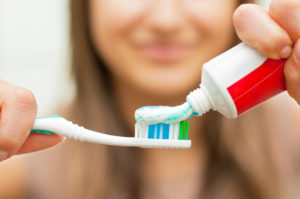How to Pick the Best Toothpaste
All toothpaste is the same, right? Not exactly. With so many different formulas on the market today, it’s vital to educate yourself about what’s available and what will work best for your teeth.
Just the Basics
Available in a gel or a paste, most commercial toothpastes include:
- An abrasive agent. Generally made from calcium carbonate and silicates, these scratchy substances help remove food, plaque and stains.
- A flavor. Many toothpastes include artificial sweeteners to make them more palatable. Mint is the most popular flavor. Cinnamon, bubblegum and even chocolate are also widely available. For the more adventurous, flavors like bacon and dill pickle are also available.
- A thickener and moisturizer. Toothpaste manufacturers add substances to maintain the right texture and consistency.
- A detergent. Ingredients like sodium lauryl sulfate make the paste sudsy. It’s also the ingredient that makes some foods taste a bit strange if you eat them immediately after brushing your teeth.

What About Fluoride?
It really doesn’t matter if you use a gel or paste formula, and the flavor certainly won’t make a difference in how well your toothpaste functions. The most important ingredient is fluoride.
Fluoride is a mineral that occurs naturally in the environment. Since its use in oral hygiene over the past 50 years, the amount of tooth decay and cavities have drastically reduced among the population.
Here’s why it’s so important. Bacteria found in your mouth eat sugar and starches that are left on your teeth after you eat or drink. When bacteria eat sugars, they release acid as a byproduct. The acid eats into your teeth, causing decay.
Fluoride protects your teeth from this acid. Fluoride makes your tooth enamel stronger and less susceptible to damage from acid. It can also remineralize areas in the early stages of decay. That means fluoride actually reverses the decay process. At Klement Family Dental, we recommend using a fluoride-based toothpaste at home along with in-office treatments, too.
Other Toothpaste Considerations
Some toothpastes contain agents designed to break down tartar, the hardened plaque that builds up on your teeth and under your gums. Tartar-control toothpastes usually include pyrophosphates and zinc citrate which help prevent the buildup of tartar. Other formulas include triclosan which kills bacteria that lives in your mouth.
If you have sensitive teeth, consider a formula to help reduce irritation. These toothpastes include potassium nitrate or strontium chloride which block pathways through your teeth to your nerves, thus preventing pain and discomfort. Sensitive formula toothpastes can take up to four weeks to work.
If you want to whiten your teeth at home, opt for a teeth whitening formula. These toothpastes don’t contain bleaching chemicals; rather they include abrasive substances that scrub away stains. You may think whitening toothpastes are bad for your tooth enamel, but studies have shown they aren’t any more abrasive than non-whitening formulas.
Have more questions about which toothpaste is right for your family? Talk with a hygienist or a dentist in St Petersburg FL at Klement Family Dental during your next regular cleaning.

